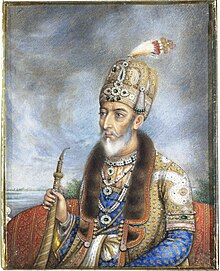
Back محمد بهادر شاه Arabic محمد بهادر شاه ARZ II Bahadır Şah Azerbaijani ایکینجی بهادرشاه AZB বাহাদুর শাহ জাফর Bengali/Bangla Bahadur Shah II Breton Bahadur Xah II Catalan بەھادور شای دووەم CKB Bahádur Šáh II. Czech Bahadur Shah Zafar Welsh
| Bahadur Shah II | |||||||||||||
|---|---|---|---|---|---|---|---|---|---|---|---|---|---|
| King of Delhi Padishah Shahanshah-e-Hindustan (Emperor of Hindustan/India) | |||||||||||||
 Portrait of Bahadur Shah II, c. 1850 | |||||||||||||
| 20th Mughal Emperor | |||||||||||||
| Reign | 28 September 1837 – 21 September 1857 | ||||||||||||
| Coronation | 29 September 1837 | ||||||||||||
| Predecessor | Akbar II | ||||||||||||
| Successor | Empire abolished (Victoria as Empress of India) | ||||||||||||
| Born | 24 October 1775 Shahjahanabad, Mughal Empire (present day Old Delhi, India) | ||||||||||||
| Died | 7 November 1862 (aged 87) Rangoon, Burma Province, British India | ||||||||||||
| Burial | 7 November 1862 Rangoon, Burma | ||||||||||||
| Spouse | |||||||||||||
| Issue | Mirza Dara Bakht, Mirza Mughal, Mirza Fath-ul-Mulk Bahadur, Mirza Khizr Sultan, Mirza Jawan Bakht, Mirza Shah Abbas, Mirza Abu Bakr Mirza Ulugh Tahir | ||||||||||||
| |||||||||||||
| House | House of Babur | ||||||||||||
| Dynasty | Timurid dynasty | ||||||||||||
| Father | Akbar Shah II | ||||||||||||
| Mother | Lal Bai[3] | ||||||||||||
| Religion | Sunni Islam (Hanafi) | ||||||||||||
| Imperial Seal |  | ||||||||||||
| Military career | |||||||||||||
| Battles/wars | Indian Rebellion of 1857 | ||||||||||||
Bahadur Shah II (born Mirza Abu Zafar Siraj-ud-din Muhammad (24 October 1775 – 7 November 1862), usually referred to by his poetic title Bahadur Shah Zafar (Persian pronunciation: [ba.hɑː.ˈduɾ ʃɑːh za.ˈfaɾ]; Zafar lit. 'Victory'), was the twentieth and last Mughal emperor and a Hindustani poet. He was the second son and the successor to his father, Akbar II, who died in 1837.[4] He was a titular Emperor, as the Mughal Empire existed in name only and his authority was limited only to the walled city of Old Delhi (Shahjahanbad). Following his involvement in the Indian Rebellion of 1857, the British deposed him and exiled him to Rangoon in British-controlled Burma in late 1858, after convicting him on several charges. The title of Empress of India was subsequently assumed by Queen Victoria.
Bahadur Shah Zafar's father, Akbar II, had been imprisoned by the British and he was not his father's preferred choice as his successor. One of Akbar Shah's queens pressured him to declare her son, Mirza Jahangir, as his successor.[citation needed] However, the East India Company exiled Jahangir after he attacked their resident in the Red Fort,[4] paving the way for Bahadur Shah to assume the throne.
- ^ a b c d e f William Dalrynple (2007). Last Mughal (P/B). Penguin Books India. pp. xv, xvi, 110, 215, 216. ISBN 978-0-14-310243-4.
- ^ Frances W. Pritchett, Nets of Awareness: Urdu Poetry and Its Critics (1994), p. 5
- ^ Syed Mahdi Husain (2006). Bahadur Shah Zafar and the War of 1857 in Delhi. Aakar Books. p. 36. ISBN 9788187879916.
- ^ a b Husain, S. Mahdi (2006). Bahadur Shah Zafar; And the War of 1857 in Delhi. Aakar Books.
© MMXXIII Rich X Search. We shall prevail. All rights reserved. Rich X Search